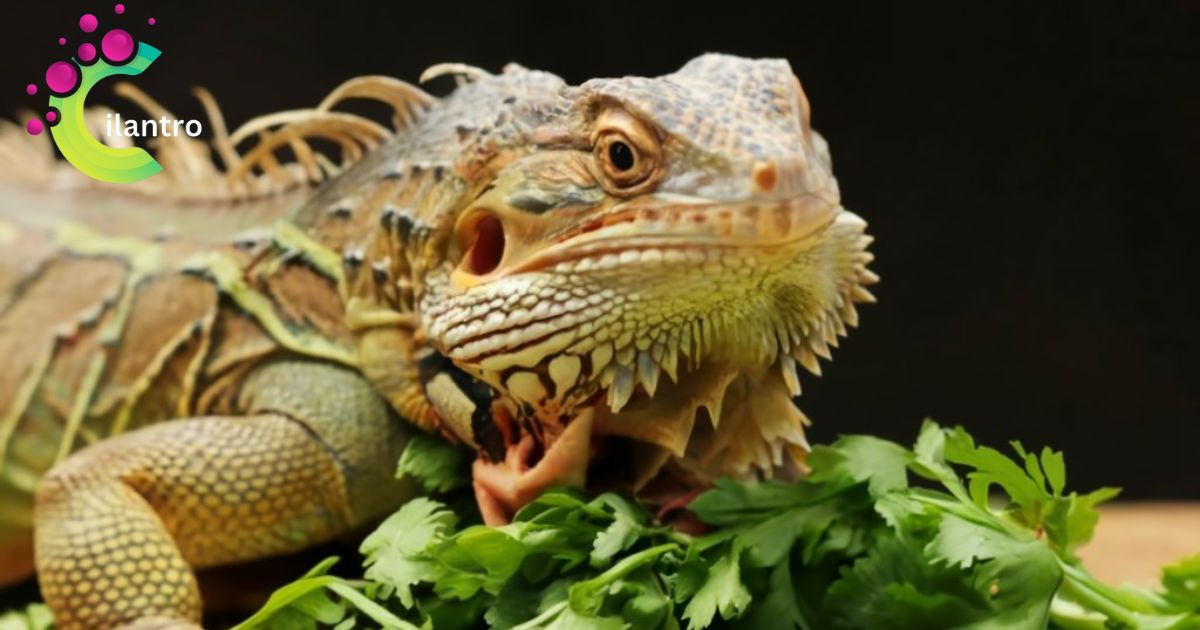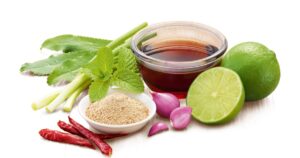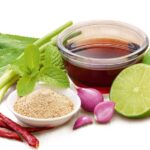Cilantro can be a healthy addition to a bearded dragon’s diet. It should be given in moderation to maintain a balanced diet. It offers a variety of nutrients, including vitamins and minerals. It promotes overall health.
The joy of feeding your bearded dragon cilantro. This tasty herb is not just delicious but also packed with essential nutrients. One question that often arises in the context of bearded dragon nutrition is, Is cilantro good for bearded dragons? Yes, when offered in moderation and as a part of a diverse nutritional plan, it can be a beneficial addition to a bearded dragon’s diet. This article explores the potential benefits and risks associated with incorporating cilantro into the diet of these fascinating creatures.
It’s a win-win for taste and health. Watch your scaly buddy thrive and enjoy every crunchy bite. Treat them to the goodness of cilantro. Bearded dragons are fascinating reptiles known for their friendly demeanor and unique dietary needs. As responsible pet owners, it’s crucial to provide them with a balanced and nutritious diet.
In this article, we discuss more interesting and beneficial things, so stay tuned with us!
How much cilantro can a bearded dragon eat?
Determining the appropriate amount of cilantro for a bearded dragon, which is cilantro good for bearded dragons, depends on its size and overall diet. Generally, it is safe to offer a small amount, such as a few leaves, as part of their vegetable intake.
Moderation is key, as excessive consumption may lead to digestive issues. Always observe your bearded dragon’s response and consult with a reptile veterinarian for personalized dietary advice. It consider incorporating herbs like cilantro into their diet, as they may offer potential benefits such as aiding in digestion and providing essential nutrients.
It’s important to introduce new elements gradually and in moderation, some believe that herbs like cilantro can have positive effects. Keep in mind, though, that individual responses may vary. If you’re interested in exploring how specific herbs, including cilantro, could impact your bearded dragon’s health, consulting with a reptile veterinarian can provide valuable insights.
It’s important to note that while some people may suggest that herbs like cilantro help you lose weight, this concept may not directly apply to the dietary needs of bearded dragons.
The Nutritional Profile of Cilantro
It is also known as coriander leaves and is a popular herb in human cuisine. Rich in vitamins and minerals, cilantro, also known as coriander leaves, boasts a nutritional profile that may pique the interest of bearded dragon owners. Some may wonder, Is cilantro good for bearded dragons? The answer lies in its nutrient content and potential benefits for these reptiles.
The herb is a good source of vitamin K, vitamin A, and vitamin C, along with essential minerals such as potassium and manganese.
How Often Can I Give My Bearded Dragon Cilantro?
The frequency at which you can offer cilantro to your bearded dragon, as part of a varied diet, depends on its overall health. As a treat, cilantro good for bearded dragons can be given once or twice a week in small, appropriately sized portions. It’s essential to ensure a balanced diet by incorporating a variety of vegetables, insects, and greens.
Bearded Dragons Vitamins and Benefits
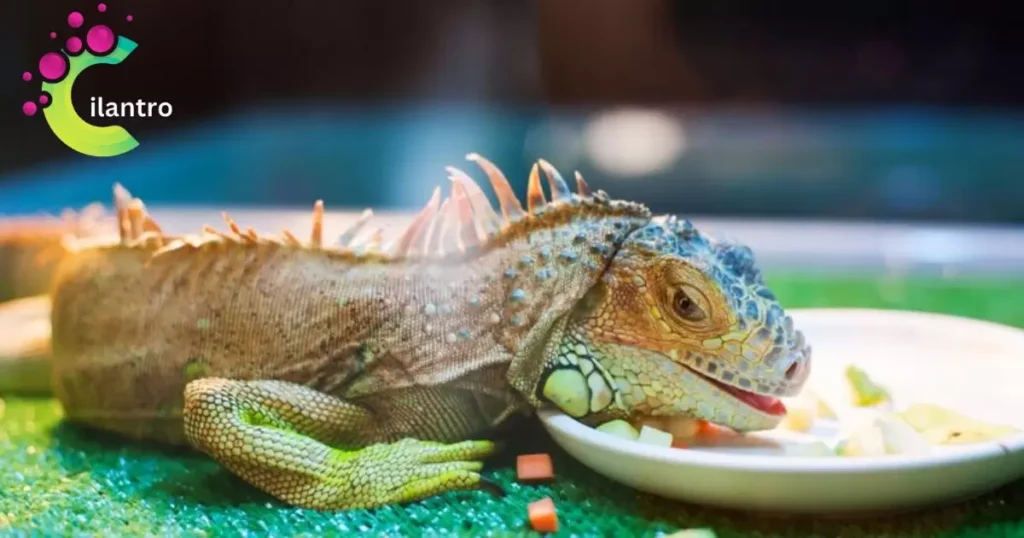
Bearded dragons require essential vitamins to maintain their overall health and well-being. These vitamins play a crucial role in supporting various physiological functions, such as bone development, immune system function, and metabolic processes.
Cilantro’s natural anti-inflammatory properties may aid in reducing digestive issues, while its enticing aroma can stimulate appetite in these reptiles. Including cilantro in their diet can contribute to a well-rounded and nutritious meal plan for bearded dragons. Additionally, many reptile enthusiasts have found that cilantro good for bearded dragons due to its beneficial properties.
Proper supplementation with vitamins, along with a balanced diet, is essential to ensure the optimal health of bearded dragons in captivity. Here are the following:
Vitamin A
Bearded dragons need vitamin A for healthy skin, vision, and immune function. Good sources of vitamin A include dark leafy greens (kale, collard greens), carrots, and sweet potatoes. Avoid excessive amounts of vitamin A, as it can lead to toxicity. Stick to a balanced diet.
Vitamin K
Vitamin K is essential for blood clotting and bone health in bearded dragons. Leafy greens like kale and spinach are rich in vitamin K. Provide a variety of greens to ensure a well-rounded diet and proper vitamin K intake.
Vitamin C
Immune system and overall health in bearded dragons. Offer fruits like strawberries, kiwi, and oranges in moderation as sources of vitamin C.
Ensure a balanced diet, as bearded dragons usually get enough vitamin C from their regular food.
Antioxidants Properties
Antioxidants help protect bearded dragons from oxidative stress and promote overall health. Include a variety of colorful vegetables like bell peppers, carrots, and dark leafy greens for a rich antioxidant diet.
It contains antioxidants, such as beta-carotene and quercetin, which can help neutralize harmful free radicals in the body. This may contribute to the overall well-being and longevity of your bearded dragon.
Potassium
Potassium is essential for muscle function and proper nerve transmission in bearded dragons. Offer potassium-rich foods such as sweet potatoes, bananas, and broccoli in moderation to support their well-being.
Fiber
Fiber aids in digestion and helps prevent constipation in bearded dragons. Provide fibrous vegetables like squash, zucchini, and leafy greens to maintain a healthy digestive system.
Water
Adequate hydration is crucial for bearded dragons to support various bodily functions. Always provide fresh, clean water in a shallow dish, and monitor their water intake to ensure proper hydration. It offers water-rich fruits like cucumbers and watermelon as a hydrating treat.
Minerals
- Potassium: Important for heart health and muscle function.
- Manganese: Plays a role in bone formation and metabolism.
Rich in Vitamins and Minerals
One of the key advantages of including cilantro in a bearded dragon’s diet is the array of essential vitamins and minerals it offers.
These nutrients are crucial for maintaining overall health, supporting metabolic processes, and preventing deficiencies.
Hydration
Cilantro has a high water content, which can aid in keeping your pet hydrated. Proper hydration is vital for digestion, shedding, and overall physiological functions.
Risks and Considerations
While cilantro has its nutritional benefits, it’s essential to be aware of potential risks and considerations when introducing any new food into a bearded dragon’s diet.
Oxalates
Cilantro, like many leafy greens, contains oxalates. High levels of oxalates can bind to calcium, potentially leading to the formation of crystals or stones in the urinary tract.
Be cautious about feeding cilantro in excessive amounts and consider balancing it with calcium-rich foods.
Individual Sensitivities
Each bearded dragon is unique, and individual sensitivities to certain foods may vary. Some dragons may not take well to cilantro, leading to digestive issues. Monitor your pet’s behavior and bowel movements when introducing cilantro for the first time.
Variety is Key
While cilantro can be a nutritious addition to a bearded dragon’s diet, it should not be the sole focus. These reptiles benefit from a diverse range of vegetables, fruits, and insects to ensure they receive a well-rounded and balanced diet.
How to Feed and Cilantro good for Bearded Dragons
To feed cilantro to bearded dragons, ensure the leaves are fresh and thoroughly washed to remove any pesticides. Chop the cilantro into small, manageable pieces to prevent choking.
Offer it as a nutritious addition to their diet, but in moderation, as part of a diverse menu that includes other vegetables and insects. No doubt cilantro good for bearded dragons. Always consult with a reptile veterinarian to ensure a balanced and suitable diet for your bearded dragon.
If you decide to incorporate cilantro into your bearded dragon’s diet, follow these guidelines:
Wash thoroughly: Rinse cilantro leaves thoroughly to remove any pesticides or contaminants.
Chop into Small Pieces: Cut cilantro into small, manageable pieces to prevent choking and facilitate digestion.
Moderation is Key: Offer cilantro as part of a varied diet, not as the main component.
Can bearded dragons eat papayas?
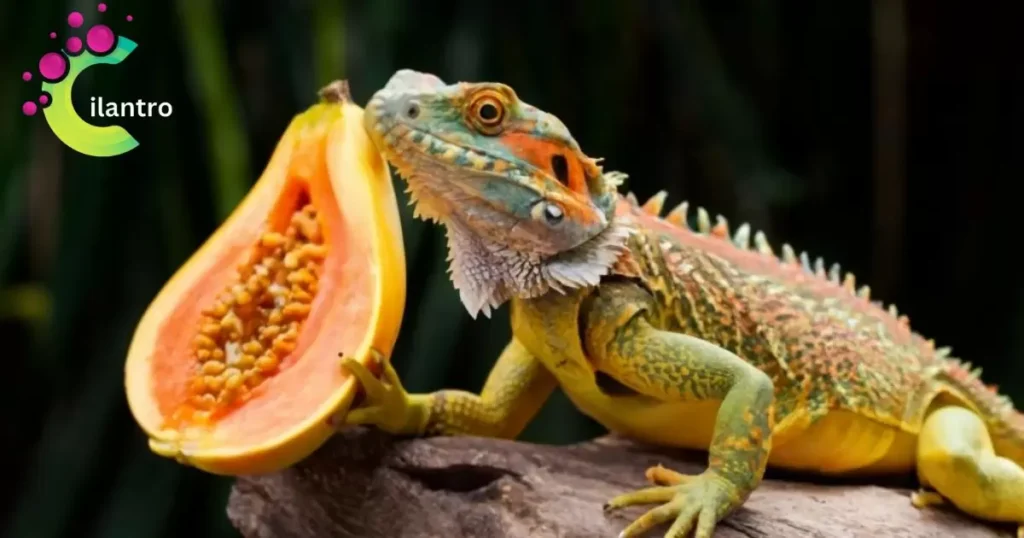
Yes, bearded dragons can eat papayas in moderation. Papayas are a good source of vitamins and minerals for them. It’s important to remove seeds and peels before feeding, as these can be hard to digest.
Always ensure the papaya is ripe and cut it into small, bite-sized pieces for your bearded dragon. Cut the papaya into small, manageable pieces for your dragon. Introduce new foods gradually to monitor their response.
Exploring the Dietary Habits of Bearded Dragons: Cilantro in Focus
It is an informative piece delving into the nutritional aspects of cilantro in the diet of bearded dragons. It meticulously examines how this herb, known as cilantro good for bearded dragons, can contribute to the overall well-being of these reptiles, considering factors such as vitamins and minerals.
The article aims to provide valuable insights for reptile enthusiasts and caretakers, emphasizing the importance of a balanced and varied diet for optimal health in bearded dragons.
Cilantro as a Nutritious Option
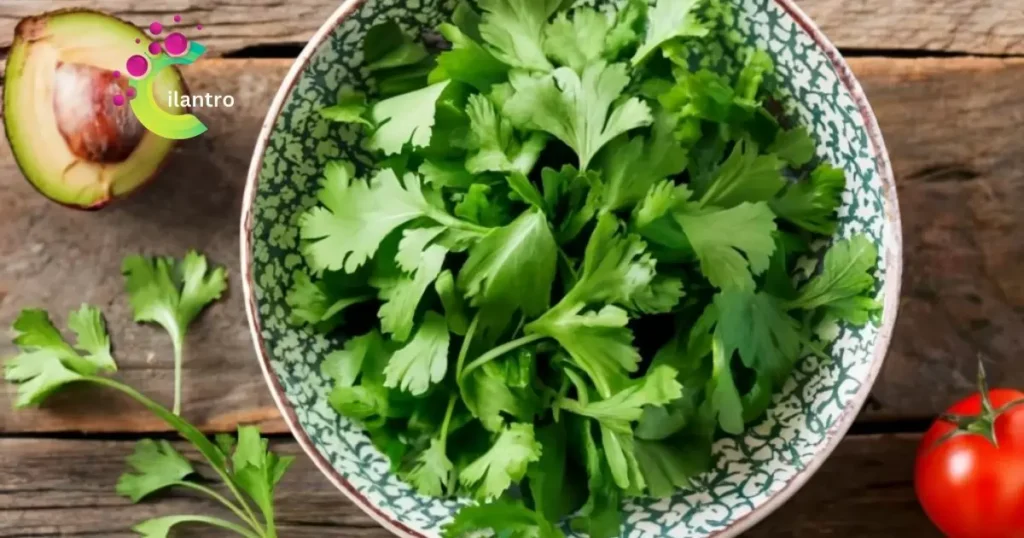
Cilantro, a leafy herb, can be a beneficial addition to a bearded dragon’s diet, providing essential vitamins and minerals.
Feeding Guidelines: Moderation is Key
While cilantro offers nutritional benefits, it should be fed in moderation as part of a varied and balanced diet to avoid potential health issues.
Observing Behavior: Tailoring Diet to Individual Preferences
Bearded dragon owners should observe their pets’ reactions to cilantro and adjust their diet accordingly, ensuring a personalized and healthy eating routine.
Understanding Bearded Dragon Dietary Requirements
Before delving deeper into the cilantro conundrum, let’s establish a foundational understanding of bearded dragon dietary needs. These reptiles are omnivores, which means they require a combination of animal protein and plant matter for a balanced diet.
Their diet typically consists of insects, leafy greens, vegetables, and the occasional fruit. Achieving the right balance is crucial to ensuring optimal health and preventing nutritional deficiencies.
Cilantro as a Potential Dietary Component
Its distinct flavor adds a refreshing and aromatic element to dishes, making it a versatile and nutritious addition to a balanced diet.
Protein Content
While cilantro is not a significant source of protein, it can complement the protein intake derived from insects. Bearded dragons, especially juveniles, require higher protein levels for growth and development. Including cilantro alongside appropriate protein sources can contribute to a well-rounded diet.
Variety and Enrichment
Introducing a variety of foods, including herbs like cilantro, can stimulate a bearded dragon’s interest in its diet. Enrichment through diverse food options not only prevents dietary boredom but also exposes them to different nutrients essential for their health.
Fiber and Digestive Health
Cilantro contains dietary fiber, which is beneficial for digestive health. A moderate amount of fiber aids in proper digestion and can prevent constipation. However, excessive fiber intake should be avoided, as bearded dragons are not strict herbivores.
Addressing Concerns: Oxalates and Calcium
Oxalates and Calcium Binding
As mentioned earlier, cilantro, like some other leafy greens, contains oxalates. These compounds can bind with calcium, potentially forming crystals or stones. While cilantro’s oxalate content is lower compared to certain vegetables.
It’s crucial to balance its consumption with calcium-rich foods. This ensures that the calcium-to-oxalate ratio remains favorable for your bearded dragon’s health.
Calcium Supplementation
To counterbalance the potential impact of oxalates, consider supplementing your bearded dragon’s diet with calcium. This can be achieved through commercially available calcium supplements or by providing calcium-rich insects. Adequate calcium is essential for bone health and overall physiological functions.
Alternative Herbs for Bearded Dragons
When it comes to supporting the health and well-being of bearded dragons, exploring alternative herbs can be beneficial. Dandelion greens are a nutritious option, rich in vitamins and minerals, while calendula flowers offer anti-inflammatory properties.
Incorporating rosemary into their diet not only adds flavor but also provides antioxidants, promoting a robust immune system. Chamomile, known for its calming effects, can be a soothing addition to alleviate stress in these reptilian companions.
It’s crucial to consult with a veterinarian to ensure these herbs are suitable for your bearded dragon’s specific needs.
FAQ’s
What leafy greens can bearded dragons eat?
Bearded dragons can safely eat collard greens, mustard greens, and dandelion greens.
Are there any precautions when feeding cilantro to bearded dragons?
Wash cilantro thoroughly to remove pesticides, and offer small, chopped pieces to prevent choking hazards.
Can cilantro be a part of a bearded dragon’s daily diet?
No, cilantro should only be given occasionally, not as a daily staple, to ensure a balanced diet.
Should cilantro be given to baby bearded dragons?
Yes, but in smaller amounts and chopped finely to suit the smaller size of baby bearded dragons.
Can cilantro replace other vegetables in a bearded dragon’s diet?
No, cilantro should be part of a varied diet that includes a mix of vegetables to meet nutritional needs.
Conclusion
Cilantro, rich in vitamins, minerals, and antioxidants, can be a valuable addition to a bearded dragon’s diet when offered in moderation. Is cilantro good for bearded dragons? involves a nuanced consideration of its nutritional content and potential risks. Its fiber content supports digestive health, and the herb’s inclusion can provide dietary variety, preventing nutritional monotony.
Cautious supplementation with calcium is essential to counterbalance the presence of oxalates, minimizing the risk of calcium-binding complications. Individual sensitivities and varied preferences among bearded dragons underscore the importance of gradual introduction and vigilant observation.
Consulting with a reptile veterinarian is recommended for tailored dietary advice. Ultimately, by incorporating cilantro judiciously alongside a diverse range of suitable foods, enthusiasts can contribute to the overall well-being and nutritional fulfillment of these captivating reptilian companions.

Meet our website’s admin, a culinary enthusiast dedicated to curating delectable food ideas. With a passion for gastronomy, they expertly craft and present a diverse array of recipes, tips, and inspirations, making our platform a go-to destination for culinary creativity.
